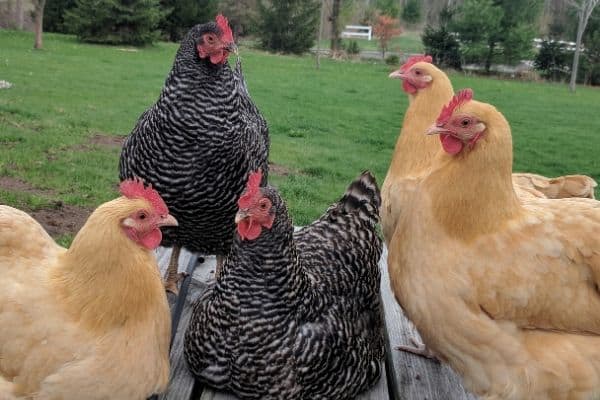When people first get into raising chickens, one of the first questions they usually have is whether they have to keep a rooster (male chicken) with their flock or not. Many farmers insist on keeping a rooster with their hens for a variety of reasons, but there are downsides to having a male in the mix too.
So can you raise chickens without a rooster? Raising chickens without a rooster is easy, and in the case of backyard chickens in the suburbs, raising hens with no rooster is the only way to prevent crowing. However, there are downsides such as lack of protection for the hens and some hierarchy issues that can crop up without a male in charge.
In the growing trend of backyard chicken keeping, a rooster is not usually an option due to noise ordinance laws. Even as some cities begin to allow people to keep chickens in their backyard, they still want to restrict roosters because of the noise associated with them. Read on to find out more about the best ways for you to keep a flock of hens without a rooster in charge.
Can You Raise Chickens Without a Rooster?
Of course! In fact, many people deliberately choose to raise a flock of hens with no rooster involved. Here are some of the reasons that people choose to raise chickens without roosters:
- Roosters lead to fertilized eggs. This means that if you don’t collect the eggs every day while fresh, they will begin to incubate and you run into the chance of cracking into half-formed or fertilized eggs. Most people don’t want to find blood spots or partially-formed eggs when they’re making their breakfast in the morning.
- Roosters are loud. Some roosters are only moderately loud. Others are loud enough that your neighbor may put out on a hit on him. But even small bantam roosters crow, and there is no such thing as a rooster who doesn’t. While some people use rooster collars to try and soften the volume of a rooster’s crow, crowing is too loud to be tolerated in most suburbs. To hear just how loud roosters can be, check out this YouTube video.
- Roosters can be aggressive. A major downside to keeping a rooster is that the rooster sees himself as the protector of the hens. Many roosters will attack their caretakers if not trained early to be civil, and even then the instinct is hard to break.
- Roosters can be dangerous. Outside of aggression, rooster attacks can lead to severe cuts, puncture wounds, and eye injuries. Roosters are particularly bad about going after small children and dogs, slashing out at them with their sharp spurs, which means a mean rooster in the yard is a huge liability.
- Roosters lead to baby chickens. If you’re trying to hold your flock population steady due to suburban regulations or just because you don’t want to take care of fifty chickens, keeping a rooster out of your flock will prevent your hens from setting chicks. Many people do not want to take the time to care for or re-home chicks.
There are many different reasons why you might not want to keep a rooster with your hens, and for homesteaders in the city or suburbs, having a rooster not only a complication, it is often also illegal due to the associated noise.
Advantages of Not Having a Rooster Infographic
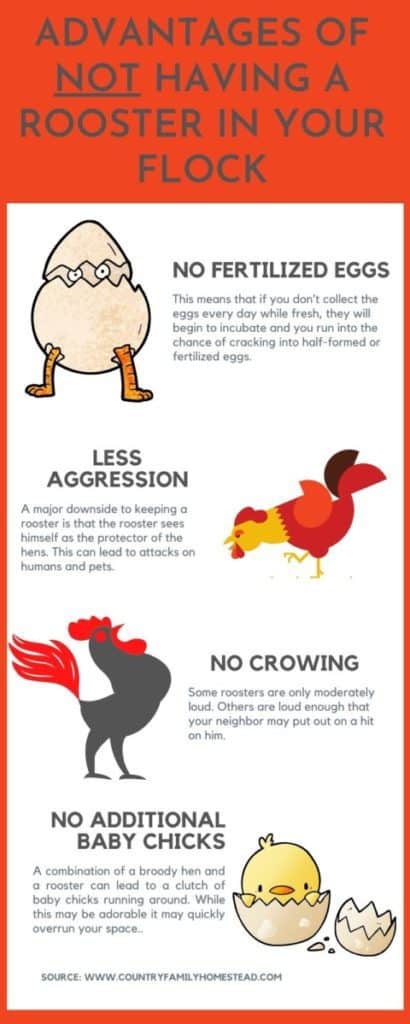
Can You Still Hatch Baby Chickens with No Rooster?
The answer is yes! – but you will need to obtain fertilized eggs. Often many hens will go “broody”, a condition where they sit on a nest and refuse to leave it out of their instinct to try and incubate a clutch of eggs.
While there are some methods for breaking a broody hen that don’t involve letting the broody hatch out chicks (such as “broody jail” or making sure no eggs remain in the nest for a hen to sit on) many chicken keepers believe that one of the most humane ways to break a perpetually broody hen is to allow her to hatch out a clutch of eggs.
If you don’t have a rooster, none of the eggs that your hens have laid will be fertilized or capable of hatching out a chick. But there are plenty of options for buying fertilized eggs online that you can slip underneath your broody hen and have her hatch out for you.
This can be advantageous for several reasons if you’re planning on expanding your flock at all:
- Chicks raised within the flock are more likely to be accepted by other chickens. When you raise day-old chicks from a farm supply store or online outlet and try to introduce them to the flock as adolescents, there is usually a period of fighting and squabbling while they establish their “pecking order”. This can result in injuries or stress for every bird involved.
- Letting a broody hen hatch out purchased fertilized eggs gives you options. If you let a hen hatch out her own rooster fertilized eggs, you’ll only get chickens of the breeds you own. But if you buy fertilized eggs to place under a broody hen, you can get eggs from all sorts of rare and colorful heritage breeds. This allows you to add some variety and color to your flock.
- Mother hens are often more apt at taking care of chicks than humans are. It is not uncommon for day-old chicks being raised by humans to die from fairly minor complications like malnutrition or temperature regulation issues. A mother hen is much more easily able to manage these kinds of problems.
Hatching fertilized eggs within the flock is a great way to get more chickens and there’s plenty of ways to get fertilized eggs that don’t involve keeping a rooster, from online poultry farms to Facebook chicken groups.
How many chickens you actually need depends on the several factors such as number of people in your family that eat eggs and whether you want to give away or sell extras. Here’s a video that might help:
Advantages of Having a Rooster
While it is possible to raise chickens without a rooster, there are also some distinct advantages to having one in your flock hierarchy. Following are some of the benefits of keeping a rooster with your flock:
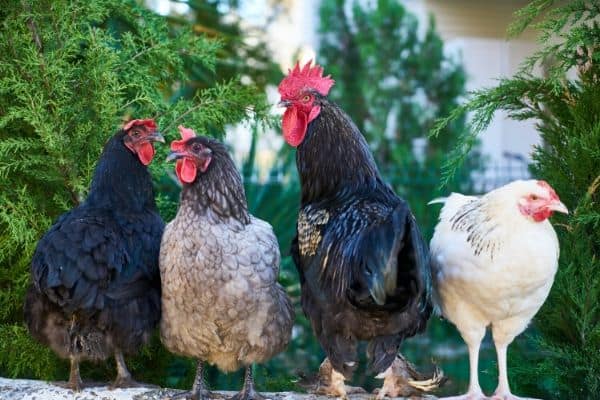
- Roosters protect their flock. If you live in a more rural or open area, free-ranging hens can be susceptible to predation from local wildlife such as foxes, coyotes, hawks, and eagles. Roosters stand guard over the flock while they forage and will raise an alert if any danger is spotted, allowing the hens time to run to safety. A rooster will also fight for its hens if pressed. Even with a rooster, protecting your chickens from predators is very important. This article gives some additional tips.
- Roosters help prevent flock hierarchy problems. When a group of hens is raised alone, there can sometimes be some squabbling amongst them over hierarchy since, in a typical chicken social group, the rooster would be the one keeping everyone in line and making sure everyone is adhering to their “rank” in the flock. In flocks without a rooster, a more dominant hen will often take up this role, however.
- Roosters are interesting to watch. Some of the most entertaining interactions you can see in your flock are courtship situations between a rooster and his hens, as he will often try to court her through elaborate gestures and gifts.
- Roosters are beautiful. Let’s face it, most of the roosters of purebred chickens are much more colorful and vividly patterned than the hens of the same variety, and there’s nothing quite so idyllic as laying in bed at the crack of dawn and hearing a rooster crow from the barnyard. (At least unless you live in the suburbs.)
- Roosters can be friendly too. While some roosters have a reputation of a nasty disposition, there are many roosters that are also quite outgoing and friendly to their human caretakers. That is, if they are hand-raised to be accustomed to human interaction and are put-in-their-place in adolescence via training.
It is easy enough to raise a flock of chickens without a rooster if noise control laws or housing zones don’t allow for one, but there are plenty of good things about roosters too.
Rooster Advantages Infographic
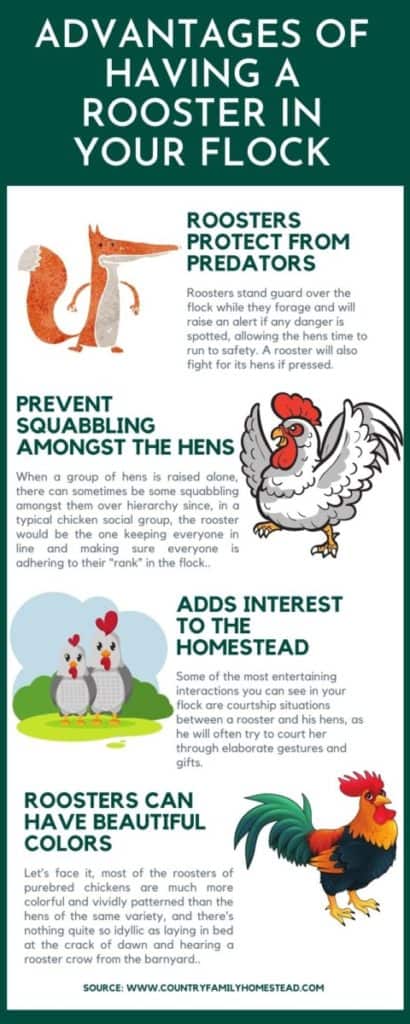
Does Having a Rooster Increase Egg Production?
No, having a rooster does not increase egg production. Most breeds of female chickens will lay an egg every one to three days once they reach sexual maturity around six months of age, and will continue to lay for the rest of their adult lives barring disease or old age (hen-opause, if you will).
That means that if you want hens but don’t want to have to put up with a rooster, you’re in luck! Your hens will produce plenty of eggs with or without a fellow around, and in fact, your chickens might actually even lay better. Being repeatedly mated by a forceful or ungentlemanly rooster can cause some hens to actually decrease in egg production over time due to stress or injury.
Roosters have no effect on how many eggs a hen will lay, but they are required if you want fertilized eggs from your own flock bloodline. However, for many backyard chicken keepers and homesteaders who are only trying to keep enough eggs around for eating purposes rather than to replenish the flock, a rooster is not necessary.
Roosters are also an advantage for those people who are raising chickens for meat and eggs rather than just eggs, as they allow the chicken keeper to perpetuate his own stock of sustainable meat. Without a rooster, it can still be done, but the eggs will have to be sourced elsewhere so it isn’t a good option for a survivalist situation where access to fertilized eggs on the market may be scarce.
How to Increase Egg Production Without a Rooster
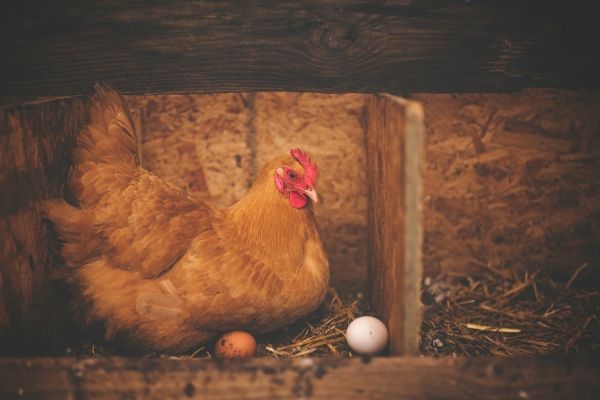
The only way a rooster will increase egg production within your flock is by allowing a broody hen to hatch a clutch of fertilized eggs and raise the chicks. In doing so, the flock numbers grows, which in turn, will increase the amount of eggs. To maximize egg production in your current flock [without a rooster], follow the tips below.
- Make sure that you’re serving up a high-quality feed. While the bulk of a chicken’s feed can come from their pellet or mash, it’s also important to incorporate healthy greens, sources of protein such as meal worms, and other supplemental foods such as fruits and vegetables to ensure that hens are happy and get all of the nutrition they need for laying eggs.
- There are some food scraps that are not recommended for chicken consumption–some of which can be poisonous. Below are a few examples of foods that should not be fed to chickens.
- avocados
- potatoes
- tomatoes
- onions
- eggplant
- dried or raw beans
- apple seeds
- moldy foods
- There are some food scraps that are not recommended for chicken consumption–some of which can be poisonous. Below are a few examples of foods that should not be fed to chickens.
- Check your chickens’ calcium levels. Lack of calcium can lead to decreased egg production or the production of eggs with malformed shells, so providing plenty of calcium in the form of oyster shell or some other supplement can help prevent egg production issues related to calcium deficiency.
- Make sure your chickens have plenty of clean water daily. Clean water is vital to produce healthy eggs, and chickens can be vulnerable to a variety of health problems without it.
- Give your chickens as much room to move around as you can. The happier your hens are, the more eggs they’ll produce, and hens love to forage. While not all backyard chicken keepers can allow their hens to free range, giving them a run that is as large as possible can not only increase egg production, it can also help prevent serious squabbles between the hens due to overcrowding.
- Keep nest boxes clean. If you don’t provide chickens a good place to lay their eggs, they might lay them in the muck of the chicken run instead. Eggs that are laid in mud or moist environments aren’t as safe to eat since the bloom (the protective membrane on the exterior of the eggshell) can be breached, allowing contamination from bacteria. To prevent having to throw out questionable eggs, encourage your girls to lay in clean, bedding-lined nest boxes.
- Make sure your flock is free of injuries, illness, and parasites. If you don’t inspect your hens regularly, you may miss health problems that could be causing them to drop in egg production. Checking over your hens often is a good way to catch sickness while it is still treatable or injuries before they become infected, both of which will put a laying hen out of commission while she’s on antibiotics.
Be sure your chickens are getting enough calcium to maximize egg laying potential. This Purina Oyster Shell Poultry Supplement from Amazon is a great choice.
If you take a few measures to improve the health and happiness of your flock, they should produce plenty of eggs for you whether you have a rooster or not.
Are Roosters Dangerous to Hens?
One of the unfortunate facts of having a rooster in a flock is that some roosters can be quite violent towards hens during the mating process. Not only can roosters be bad about tearing up the necks and shoulders of hens from riding them too much, but they have also even been known to scalp them in the process.
Obviously these kinds of injuries are not only dangerous for the hens and leave them open to bacterial infections that have to be cleaned and monitored, but they also end up damaging the hen’s feathers along her back and a rooster can even mate a hen bald if she isn’t given some respite.
It’s important when picking a rooster for a flock of chickens that you choose a rooster with a good temperament who is gentle around the hens. Many adolescent roosters (also known as cockerels) are notoriously bad-mannered when it comes to courting hens, but hens can often police this behavior themselves if left to their own devices.
However, if you end up with a rooster who is aggressive to the hens, breeds with them to the point that they become stressed or injured, or is aggressive towards humans, the best course of action is to get rid of the rooster and find one that has a better temperament. With roosters, it’s easy to find a replacement, and you don’t want to keep a nasty rooster around when there are plenty of friendly ones out there.
Roosters Aren’t a Necessity for Raising Chickens
If you want to raise your own flock of chickens for eggs, it’s simple to do without a rooster. While roosters provide a lot of benefits to your flock, they also have several disadvantages that can make keeping chickens more complicated, especially for first-time owners or people who live in a town or city.



